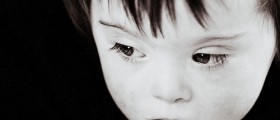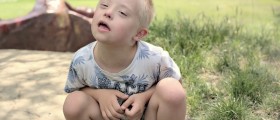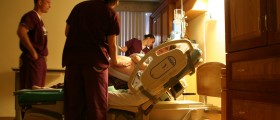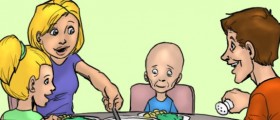
Down syndrome or trisomy 21 is one of the most common genetic diseases. This genetic disorder is caused by the presence of extra 21st chromosome or a part of this chromosome, hence the name for the disorder. Down syndrome is usually identified with amniocentesis in unborn fetuses, but it can also be diagnosed in a baby at birth.
Symptoms of Downs Syndrome
Patients are commonly experiencing moderate to serious developmental problems, mental retardation and learning disabilities. Children with this syndrome are easily recognized by the specific facial and body features. They usually have flattened face, small head and short neck, while many of them have unusually shaped ears, upward slanting eyes and protruding tongue.
Some kids suffering from Down syndrome may be of average height, but in most cases they grow fairly slow and are shorter than kids of the same age. Doctors and parents may notice excessive flexibility of the body, poor muscle tone, relatively short finger and broad short hands. Many patients with Down syndrome have a single crease in the palm of the hand.
These kids usually take two times more time than healthy children to start sitting or crawling. As we already mentioned, Down syndrome is associated with a certain degree of mental retardation, which can range from mild to moderate or even severe.
Risk Factors and Prevention
Doctors have identified several risk factors associated with Down syndrome, such as: advancing maternal age, giving birth to a child with this syndrome and also being a carrier of the genetic translocation for Down syndrome.
There is no way to prevent this problem and genetic counseling is the only way to find out whether you are at risk to have a baby suffering from Down syndrome. This is especially recommended to people who already have a child suffering from this disorder or if you are exposed to higher risk of giving birth to a child with Down syndrome.
Coping with Downs Syndrome
Parents with the child suffering from Downs syndrome should consult several professionals, including doctors, teachers and therapists, all in order to decide the best strategies for their child’s education and treatment. Other people coping with the same problem may be very helpful and offer some support, as well as some Internet support groups.
There are certain people believing that Downs syndrome children and people should be isolated and educated in special education schools. This is simply not true. Also, adult people with Down syndrome don’t have to live in institutions, but they are able to have a job and live with their families or independently.

















Your thoughts on this
Loading...